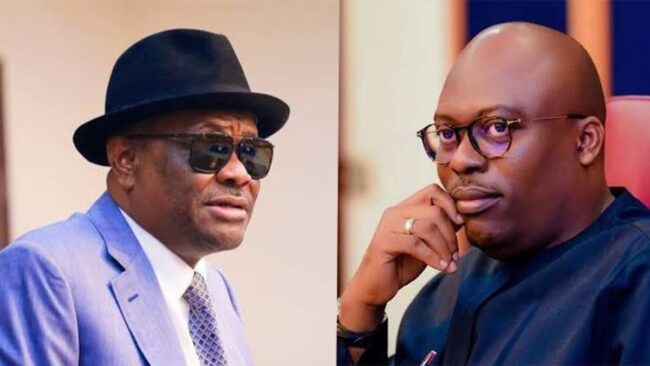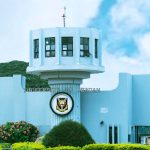Federal Capital Territory (FCT) Minister, Barr. Nyesom Wike, has said that the suspended Governor of Rivers State, Siminalayi Fubara, has not reached out to him to apologise—a condition Wike says is necessary before considering forgiveness.
The Minister stated that a key requirement for forgiving someone who has done wrong is that the person must first acknowledge their wrongdoing and make efforts to seek forgiveness.
Wike, speaking through his media aide, Lere Olayinka, was reacting to a call by Niger Delta ex-militant leader, High Chief Government Ekpemupolo, popularly known as Tompolo, who urged him to forgive Fubara, his estranged political protégé.
Tompolo, in a recent statement on the Rivers State crisis, emphasized the need for restraint and unity, urging Wike to set aside his anger for the greater good.
“And just like I will not accept rebellion from my son, I will also not cause more problems. Wike is angry, but he has to calm down for the good of all. We will have a dialogue and resolve all lingering issues, and Fubara will return to his seat,” Tompolo said.
Responding to the appeal, Wike, through Olayinka, clarified that he had not accused Fubara of any personal wrongdoing but had merely called for adherence to proper governance principles.
He explained the reconciliation process, saying that even if an offence had occurred, the offender must first admit it and reach out for reconciliation and forgiveness.
He further questioned the governor’s change in attitude towards Wike, pointing out that Fubara had previously worked closely with him.
ALSO READ: Anambra 2025: Arthur Eze endorses Soludo for second term
He said:
“There is no offence. It is only when someone offends you personally that forgiveness becomes necessary. As Christians, let’s even assume that Fubara has offended the Minister—do you forgive someone who hasn’t come to seek forgiveness?
The person must first acknowledge in his heart that he has done wrong. Has Fubara come to seek forgiveness? I’m not saying there is an offence and that forgiveness is required, but he hasn’t even made that move.
The Minister has never said that Fubara offended him personally. He only emphasized that Fubara should govern according to the rule of law and not abandon those who risked their lives and resources to make him governor. That’s not too much to ask. He said, ‘Don’t just discard those who helped you get here.’ This isn’t about forgiveness. If there’s anyone Fubara should apologise to, it’s the President.
He’s the one who needs to do some soul-searching, because throughout the time he worked with Wike—when Wike was taking all the risks for him—Wike wasn’t a bad person then. So, at what point did Wike suddenly become the enemy? When did Fubara become so bold as to say he would deal with Wike? He should reflect on that.”
Olayinka concluded by emphasizing that reconciliation must be mutual:
“You’re begging a doctor to provide medicine for someone who is sick, but you’re not asking the sick person to take the medicine. So what happens then?”
WATCH TOP VIDEOS FROM NIGERIAN TRIBUNE TV
- Let’s Talk About SELF-AWARENESS
- Is Your Confidence Mistaken for Pride? Let’s talk about it
- Is Etiquette About Perfection…Or Just Not Being Rude?
- Top Psychologist Reveal 3 Signs You’re Struggling With Imposter Syndrome
- Do You Pick Up Work-Related Calls at Midnight or Never? Let’s Talk About Boundaries







